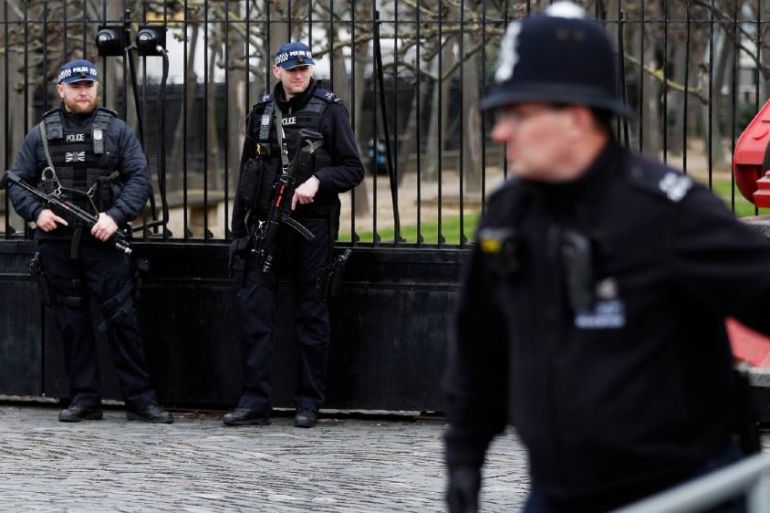Latest UK ‘terrorism’ legislation criticised by rights groups
A further tightening of measures against people who have not been convicted undermines British justice, say campaigners.

Civil liberties groups have criticised the British government’s latest overhaul of the United Kingdom’s “terrorism” legislation, highlighting the potential for indefinite restrictions placed against those suspected – but not convicted – of terrorism.
The burden of proof would be lowered for officials considering placing “terrorism prevention and investigation measures” (TPIMs) against suspects, while the current two-year limit on their use would be removed, under legislation unveiled on Wednesday.
Keep reading
list of 3 itemsUK: Inmates wearing fake suicide belts attack prison guards
Police shoot dead man after ‘terror-related’ stabbing in London
Under the proposed law, courts would be able to limit a suspect’s movements, enforcing curfews and electronic tagging for an indefinite period, subject to review. Minimum sentences would rise and the most serious offenders, if released, would remain on licence for the rest of their lives and could be taken back into custody.
“We promised to act and today we are delivering on that promise,” Home Secretary Priti Patel said in announcing the plan.
|
|
But campaigners said the proposals were a fundamental threat to justice.
“It was never right to drastically curtail people’s liberty on the basis of secret, untested evidence using control orders or TPIMs – and we seem to be diving headlong into that territory, where the standard of proof is extremely flimsy and people’s liberties can be curtailed on an indefinite basis,” said Rachel Logan, Amnesty International UK’s legal expert.
The new restrictions are needed, say the government, after Usman Khan killed two people in a knife rampage, injuring several more, near London Bridge in November. The attacker was tackled by members of the public and shot dead by police officers.
The 28-year-old had previously served six years in prison for plotting to bomb the London Stock Exchange, was out of prison on licence and required to wear an electronic tag.
“This is an announcement designed first and foremost to grab headlines, as the government struggles over its coronavirus response, rather than to make any change in the legal or security situation,” Scott Lucas, professor of international politics at the University of Birmingham, told Al Jazeera.
“Boris Johnson used the London Bridge attack during the December election campaign to proclaim an extension of terrorism sentences. That came into force in April.
“Now Priti Patel talks about mandatory minimum sentences of 14 years, and of permanent surveillance and control of those who have not been charged. So the question again is: will a political gambit for power, amid questions about performance, lead to a significant change in law, imprisonment, and the security state?”
Human rights experts said the government’s counterterrorism strategy was failing.
“This legislation not only authorises people being locked up indefinitely, it also poses a threat to fundamental pillars of our justice system. By reintroducing, in all but name, the widely condemned Control Orders, a fundamental principle of justice – the presumption of innocence – hangs in the balance,” said Rosalind Comyn, policy and campaigns officer of human rights group Liberty.
“Control Orders allow people to be placed on indefinite house arrest without trial – and this can happen based on suspicion rather than charges, evidence and proof. Control Orders were abolished by the coalition government as a stain on our human rights records and that’s where they should remain.”
Those who read a little deeper into government action may worry about the attack on personal freedoms, but it's not that easy to make a case in favour of those suspected of terrorist involvement
Mark Shanahan, head of the politics department at the University of Reading, said tougher TPIM restrictions may not make much of a difference when it came to preventing violence, as they had not been widely used since their first introduction.
“Anything that appears to make life tougher for terrorist suspects will play well with the Conservatives’ natural base, but is also likely to go down well with the wider public in the wake of the relatively recent London terror attacks,” he told Al Jazeera.
“The same can be said for the new minimum sentences. Making sure convicted terrorists are off our streets for longer will be a popular move. And at a time when virtually all media is dominated by a less-than-stellar response to the coronavirus crisis, and with a Brexit bubble close to bursting in the background, this is an attempt by the Home Office to show strong and decisive action that paints the government in a positive light.
“Those who read a little deeper into government action may worry about the attack on personal freedoms, but it’s not that easy to make a case in favour of those suspected of terrorist involvement.”
The timing of the government’s move has also caused concern.
“The fact this bill is being issued during a pandemic, when Parliament is not operating at full capacity or able to deliver normal levels of scrutiny, should be a cause of concern for all who care about the future of our democracy and justice,” warned Liberty’s Comyn.